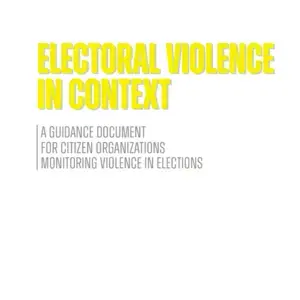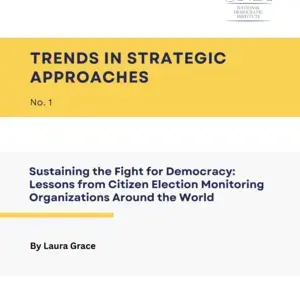On September 8, the Palestinian High Court ordered the suspension of elections in the West Bank and Gaza scheduled for October 8. The elections would have been the first democratic contest in both territories since those for the Palestinian Legislative Council in 2006. The court ruled that the polls cannot take place due to disputes over candidate lists and the inability of elections to be administered in Jerusalem.
The following statement was prepared just prior to the court decision based on an assessment of the electoral environment. While the pending court case was identified as an issue that could disrupt the electoral process, the National Democratic Institute hopes that the issues holding up the polls can be resolved and local elections held as soon as possible to allow the Palestinian people to exercise their right to participate in a democratic political process.
STATEMENT OF THE NATIONAL DEMOCRATIC INSTITUTE PRE-ELECTION ASSESSMENT DELEGATION TO THE 2016 WEST BANK AND GAZA LOCAL ELECTIONS
Jerusalem, September 7, 2016
The National Democratic Institute (NDI) organized a pre-election assessment from August 24 to September 1 in advance of the October 8 local elections in the West Bank and Gaza. The purposes of NDI’s mission were to: demonstrate the interest of the international community in the development of stronger democratic political processes and governance in the Palestinian Territories; assess the prevailing political environment in the West Bank and Gaza and preparations for the polls; and identify areas where improvements may be needed to enhance the integrity of the process.
The delegation included: Owen Kirby, former Senior Advisor in the Department of State’s Middle East Partnership Initiative (MEPI) and currently consultant for the International Republican Institute (IRI); Paula Fynboh, National Field Director for Sandy Hook Promise and grassroots political advisor; Keith Cooper, Vice-Chair of the Ontario Workplace Safety and Insurance Tribunal and an elected director of the Society of Ontario Adjudicators and Regulators; Emily Harding, NDI’s Resident Representative for West Bank/Gaza programs; and Angela Short, Senior Program Officer for the Middle East and North Africa at NDI. All aspects of the assessment were conducted in accordance with international standards as set forth in the Declaration of Principles for International Election Observation, which is endorsed by 36 intergovernmental and non-governmental organizations, including the United Nations Secretariat.
During the course of the assessment mission, members of the delegation met with a range of people involved in the electoral process, including: officials from the Central Elections Commission (CEC); representatives and candidates of political parties; independent candidates; officials of the Ministry of Interior of the Palestinian Authority (PA); domestic election observers; civil society activists; pollsters; journalists; academics; and representatives of the international community. The delegation visited the key population centers of Bethlehem, Dura, Gaza City, Hebron, Jerusalem, Nablus, Qalqilya, and Ramallah to assess electoral preparations and political dynamics.
NDI and the preelection delegation appreciate the hospitality and frankness of all those who participated in the assessment and offer this statement with the hope of strengthening the development of democratic processes and institutions. In issuing this statement, NDI and the delegation seek neither to interfere in nor to render a final assessment of the election process; NDI recognizes that it is only the Palestinian people who can determine the credibility of their elections.
Summary of Observations
Political Context
On October 8, Palestinians living in the West Bank and Gaza will have the opportunity to elect new local councils. In the 416 cities, towns, and villages in the West Bank and Gaza, 859 political party and independent lists will run for local council seats. 193 localities will hold elections in which multiple candidate lists are competing. In 182 localities, only one list has been certified and will be awarded seats by acclamation. In an additional 41 localities no list was certified, either because none were submitted or because lists did not meet the legal requirements. According to the law citizens in these localities will have the opportunity to submit lists and participate in a second round of elections expected to take place at a later date.
Most Palestinians with whom the delegation met expressed a desire to participate in credible, competitive elections on a regular basis, and most expressed frustration at the history of postponed and canceled elections. Many viewed the October 8 polls as an opportunity to put the democratic process back on track.
Since Hamas’ victory in the 2006 legislative elections and the subsequent division of the West Bank and Gaza, Palestinian governance has experienced a number of setbacks. In both territories, governments have harassed or arrested political opponents, and shut down or pressured organizations with suspect loyalties. In the West Bank, the executive branch has ruled by decree with no legislative oversight for a decade and in recent months has experienced public sector protests and incidents of communal violence leading to heavy-handed responses by the security services. Since its 2007 takeover of Gaza, Hamas has ruled the Strip through parallel government institutions and security forces that many Palestinians and international actors alike view as illegitimate. The shadow of this takeover and crackdown on Fatah supporters continues to loom large in the minds of Gazans. Not surprisingly, public opinion polls show a perceived decline of basic rights and freedoms in both the West Bank and Gaza
Few people view the local elections as the solution to these problems, but the polls do represent an attempt to address the public’s calls for more accountable and responsive government. They also represent a chance to stem the democratic retrenchment of the past few years. While local councils’ mandates are limited to service delivery and subject to limited budgets and oversight from centrally appointed governors and ministries, the local elections are politically significant for several reasons:
- Hamas, the second largest party in the Palestinian Territories and the ruling entity in Gaza, is participating in the elections in both the West Bank and Gaza for the first time since it won the Palestinian Legislative Council elections in 2006. It remains identified as a terrorist organization by most Western governments, which is likely to cause reverberations within the West Bank and Gaza, Israel, and internationally depending on the October 8 outcome. Hamas’ participation also raises questions about democratic norms and democratic elections as it has not renounced violence or given up arms, yet is a contestant in a political process which should represent peaceful political competition.
- The elections will be the first time that a new generation of voters will have the opportunity to choose from across the political spectrum, with nearly 25 percent of registered voters not old enough to have participated in the January 2006 parliamentary vote.
- The October 8 polls will be the first elections called by the PA since 2006 that will include citizens in both the West Bank and Gaza and will take place on time—four years since the last municipal elections held in the West Bank in October 2012. In this regard, these polls are a meaningful democratic exercise in holding regular elections for Palestinian citizens.
- In 2006, Hamas ran a well-organized campaign and is anticipated to do the same for this upcoming vote. While Hamas has not participated in formal polls for local or national-level elected bodies since 2006, the movement has demonstrated its continued influence in the West Bank through university and union elections. Hamas has compiled lists of technocrats rather than political figures in order to allay fears of repercussions from voting for Hamas-branded lists, and to demonstrate to citizens it can address the service delivery requirements of municipalities. Hamas’ participation will make the election competitive, therefore making for a more robust campaign environment, but may also give rise to security concerns. There have already been reports of Hamas members being arrested by Fatah-controlled Palestinian Authority security forces and the Israel Defense Forces.
- For citizens in Gaza, these polls represent the first elections of any kind in ten years. While Palestinians in the West Bank have had the opportunity to participate in university student elections, labor union elections, and elections for other bodies, Gaza has had no parallel democratic exercises since the 2006 legislative elections.
- The Palestinian Authority is allowing Hamas to administer elections in Gaza. Schools, teachers, and security forces are instrumental in election day administration and during the campaign period. While the recognition of these institutions is only for election purposes, it represents at least temporary legitimacy of the Hamas apparatus in Gaza and coordination between Hamas and Fatah. However, a court case has been initiated in the West Bank to challenge the legitimacy of Hamas-run institutions to administer elections. It is unclear when a decision will be rendered.
Regardless of which parties and candidates claim victory in the elections, the power they will wield as members of local councils is limited. Governors, who oversee local councils, are appointed by the PA, as are the security forces omnipresent throughout the Palestinian Territories. Additionally, the Ministry of Local Government disburses funds for localities and is beholden to the PA and not to locally elected officials. Families and clans also wield significant power and influence, and in many localities familial ties outweigh party affiliations.
Electoral Framework
Local elections in the Palestinian Territories are conducted using a proportional representation system with closed candidate lists. Each list’s candidates are ordered based on candidate priority, but the names of the candidates will not appear on the ballot, only the names and symbols of each party, coalition, or independent list. The number of candidates in a list cannot be less than the majority of local council seats in that list’s locality. In discussions with the delegation, some candidates and observers said they would prefer to vote for individuals, rather than lists.
Each list that obtains eight percent or more of the valid votes is allocated a number of seats in proportion to the number of valid votes obtained, following the SainteLaguë method whereby a formula is used to calculate successive quotients for each list. The seats are allocated to the candidates according to the order of their names on the list. Many people, including electoral competitors, expressed confusion surrounding the electoral system, pointing specifically to the complicated mathematical formula used in the Sainte-Laguë method.
The elections law mandates a minimum level of participation of women on the local councils, and includes a quota for women on candidate lists. A council with 13 or fewer seats must include at least two women, and a council with more than 13 seats must include at least three women. If a local unit contains fewer than 1,000 voters, that council is exempt from the quota requirements. For councils with 13 or fewer seats, candidate lists must include a woman among the first five names and a woman among names six through ten. For councils with more than 13 seats, a woman must also be included in the final five names on the list. Approximately 25 percent of candidates for the October 8 polls are women, and some lists are led by women. In the West Bank town of Dura a list comprised completely of women is competing.
As referenced above, there is a court case that has been filed by a syndicate of lawyers in the West Bank to challenge the legitimacy of Hamas to oversee elections in Gaza. Lawyers argue that since the authorities in Gaza are not officially recognized, the security forces and other institutions do not have the legal mandate to conduct polls. It is unclear whether this could be used by the PA as a technical rationale to scuttle the elections.
Technical Preparations
Most people with whom the delegation met expressed high confidence in the CEC’s ability to administer the elections in an impartial and professional manner. Palestinians expect election day to proceed smoothly, and for polls to be conducted professionally and in accordance with the law. Many people display an impressive command of the electoral system, calendar, rules, and processes—a function of both the high degree of sophistication of Palestinian political actors and the CEC’s efforts to maintain regular communication with candidates and party leaders, observers, and other stakeholders.
Election and security officials expressed confidence that negotiations between Palestinian and Israeli officials will result in agreements for the movement of materials and personnel throughout the West Bank and Gaza.
Security forces in the West Bank and Gaza will be able to vote on October 6. This is the only alternative voting mechanism used in the election.
Citizen Engagement
Public opinion polls have demonstrated for some time that Palestinian citizens are supportive of elections to choose their leaders, particularly national-level leaders whose mandates expired in 2011. This interest in participating in elections is reflected in high voter registration figures: voter registration in Gaza is 91 percent of eligible voters, versus 78 percent in the West Bank. Based on conversations the delegation had, citizens are significantly more motivated to vote in the upcoming polls in Gaza, where the October 8 vote will be the first opportunity for citizens to participate in a democratic exercise of any kind in ten years.
In the West Bank, citizens in districts where multiple lists are competing seem more interested in the polls. However, as local elections occurred in the West Bank in 2012, as well as university and union elections since then, the significance of these elections is felt less in the West Bank than in Gaza.
While the official campaign period had not begun at the time of the delegation’s assessment, numerous candidates and civic activists indicated that campaigns will rely on social media in addition to traditional voter outreach tactics such as flyering and rallies. However, as many candidates are from well-known families, it was inferred that not much campaigning would be needed to educate voters about themselves.
The representation of women on lists is around five percent higher than the quota requirement. Activists in the West Bank and Gaza expressed satisfaction with this result, and activities are planned to support women candidates during the campaign period in both territories. Activists have plans to raise awareness about women’s issues through radio, brochures and murals, and also to encourage women and persons with disabilities to observe elections.
While many Palestinians think the legal age to run as a candidate should be lowered from 25 to 21, there is evidence of strong youth engagement in the elections. Young people under 30 make up nearly 70 percent of the Palestinian population, according to the Palestinian Central Bureau of Statistics’ 2015 study. Individuals who have reached the legal voting age of 18 since the last local elections in 2012 and are eligible to vote for the first time in 2016 comprise close to 17 percent of current registered voters, while the total number of registered voters who are 30 and younger constitutes more than 41 percent of the overall electorate, making youth a powerful voting bloc. Organizations with a focus on young people in Gaza have reported that more than 100 youth will be involved in poll watching. Youth in other localities have plans to launch issue-based campaigns in advance of the elections. The desire to participate and cast a vote is strong, especially in Gaza.
Political Parties and Campaigns
Since 2006, Hamas and Fatah have made various attempts at reconciliation. Earlier this year there were three rounds of talks, the last of which took place in Qatar and dissolved on the first day of the meeting. There is discord on several issues about how to share power across the West Bank and Gaza, namely how to manage security forces that are allegiant to Fatah and Hamas respectively. While using local elections as a tool within the reconciliation process does not seem to be the strategy of Fatah or Hamas, local elections are likely to yield municipalities where power sharing is necessary. For example, Gaza City elections will likely produce a mixed council with Fatah and Hamas representatives where they would need to negotiate with the Ministry of Local Government for resources.
A potential sign that reconciliation could be possible is that Fatah and Hamas were able to agree at the local level and submit unity lists in some districts, most notably Nablus.
Local elections could help pave the way for Palestinian Legislative Council and presidential elections. Some speculate that local elections are logically a precursor to national elections, which could produce a Fatah-Hamas reconciliation by vote, but this is not certain. Prior to the current coordination and participation by both Fatah and Hamas in local elections, the relationship between the two movements held little hope for meaningful reconciliation.
While Fatah in the post-Arafat era continues to be riven by internal divisions that witnessed the party submitting rival lists within the same district for the 2006 parliamentary elections, it is displaying greater unity and discipline in the lead up to the October vote. Notably, single Fatah-branded candidate lists were submitted in all 25 Gaza localities.
Hamas is not branding lists as Hamas, but rather supporting independent lists of professionals (engineers, doctors, lawyers, business leaders)—a strategy employed in previous elections. Analysts estimate that clearly identified Hamas-supported lists and candidates are competing in only around ten percent or less of West Bank localities. It is thought that Hamas will likely organize its members to support specific independent lists in most other localities.
Small leftist parties have formed a coalition called the Democratic Alliance that is fielding candidates in the West Bank and Gaza. The coalition is comprised of five parties: Palestinian Democratic Union (FIDA); Democratic Front for the Liberation of Palestine (DFLP); Palestinian People’s Party (PPP); Palestinian National Initiative (PNI); and Popular Front for the Liberation of Palestine (PFLP). The coalition aims to be an alternative within the polarized Fatah-Hamas landscape.
While NDI heard few specific policy proposals, candidates with whom the delegation met described a determination to keep the campaign focused on local issues. The delegation did not hear of plans for candidate debates or other forums through which citizens can compare policy proposals.
The relatively short 13-day campaign period is followed by a oneday silence period. Candidates and party representatives expressed some confusion about the definitions of acceptable activities before and during the campaign period. Some candidates also expressed concerns about equal access to media, an issue that could be exacerbated by the lack of campaign spending regulations.
Electoral Integrity and Operating Environment
While there is some faith that the security forces in the West Bank and Gaza can keep calm during the campaign period, citizens and party officials believe the elections will not operate in a fully peaceful environment. The Independent Commission on Human Rights reported that it received numerous complaints from candidates about intimidation and harassment from security forces and anonymous sources. Lack of trust and suspicion of the other has been reported from both Fatah and Hamas-leaning camps.
Fatah questions whether it will be able to operate freely in Gaza. One Fatah campaigner in Gaza City shared with NDI that Hamas gave a directive to all hotels that they cannot host Fatah events without written permission from Hamas. This campaigner also reported online bullying and slander of Fatah operatives and candidates, as well as threats from unidentified people over the telephone. On August 29 it was reported that two Fatah campaigners were kidnapped and tortured for hours in Khan Younis in the Gaza Strip.
It is reported that Hamas has similar concerns about operating in the West Bank. On August 16 the sole Hamas member on the CEC was arrested by the Israel Defense Forces on charges of incitement. Palestinian Authority arrests of Hamas affiliates have also been reported.
All participating parties signed a Code of Conduct for the election period.
Recommendations
The delegation respectfully suggests that the following steps be considered to further enhance confidence in the October 8 polls, and in future elections:
- The delegation recommends that Palestinian civil society organizations, political parties, candidate lists, and the media increase their efforts to generate debate and discussion on local priorities during the campaign period. Parties should have realistic platforms that address citizen priorities. Candidate debates or other public forums could provide an opportunity for citizens to compare policy proposals.
- The Palestinian leadership should take all necessary steps to provide a peaceful environment conducive to the free expression of voters. Officials at all levels should ensure the neutrality of security forces and take steps to guarantee that public resources, including government funds, vehicles, communications equipment, materials, and work hours of government employees, are not used for the benefit of individual candidates or lists.
- Regional actors with interest in the Palestinian elections should not intervene in or disrupt the process, respecting the right of the Palestinian people to participate in a democratic process and freely elect their officials. For example, as they have been recognized for doing to date, Israeli officials should continue to facilitate the transit of election-related materials and personnel from the West Bank to Gaza.
- Following elections, the delegation recommends that authorities initiate an inclusive debate among stakeholders about the electoral system, including: the use of closed candidate lists and other elements of the proportional representation system, quotas for women, the age of candidacy, and the list certification process.
- Following elections, local councils should ensure that they play their proper role in responding to citizen interests and offering the public opportunities for direct engagement. Elections should be held on a regular schedule.
- Following elections, considering the complicated and nuanced environment of local politics in the West Bank and Gaza, local analysts and activists and the international community should resist viewing the results solely as a test of strength of one party over another. If the election process is completed to an acceptable standard, the desire for Palestinians to exercise democratic rights, transparency, and accountability will have been demonstrated and the credibility of local governments should be enhanced.
For further information, please contact:
Emily Harding, NDI Resident Representative, West Bank & Gaza
+972 (0) 54 555 7152
Angela Short, NDI Senior Program Officer
+1 202 728 5487




